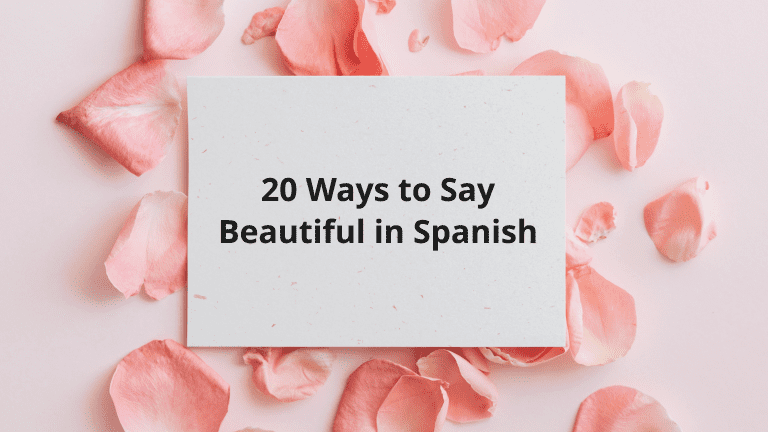What better way to make someone swoon than calling them beautiful in Spanish?
Spanish is fittingly one of the most beautiful languages out there. The most common way to say beautiful in Spanish is hermosa (feminine) or hermoso (masculine), and you have probably heard these phrases either in movies or other sorts of media. Besides this, there are actually a lot of ways to say beautiful in Spanish, and in this article, we will be discussing them with some example sentences and additional terms of endearment!
When learning Spanish it’s a good idea in the beginning to learn phrases that you can use in everyday situations, such as how to say beautiful in Spanish. You will start to adapt to the language, thereafter, learning certain topics in depth such as adjectives in Spanish or conversational Spanish should be your next priority to refine your Spanish speaking skills!
Now, onto expanding your beautiful Spanish vocabulary!
20 Ways to Say Beautiful in Spanish
Below is a summary of all the (adjectives) words that mean beautiful in Spanish, in feminine and masculine forms respectively, that we will be discussing alongside the English translation:
| Spanish | English |
|---|---|
| Hermosa / Hermoso | Beautiful |
| Bella / Bello | Beautiful |
| Bonita / Bonito | Pretty/Nice |
| Preciosa / Precioso | Gorgeous/Precious |
| Guapa / Guapo | Beautiful |
| Linda / Lindo | Beautiful |
| Adorable | Adorable |
| Atractivo / Atractiva | Attractive |
| Radiante | Radiant |
| Divina / Divino | Divine |
| Agraciada / Agraciado | Graceful |
| Mona / Mono | Pretty |
| Chula / Chulo | Cute |
| Deslumbrante | Stunning |
| Buena / Bueno | Good-looking |
| Belleza | Beauty |
| Estupenda / Estupendo | Wonderful |
| Espectacular | Spectacular |
| Regia | Magnificent |
| Encantadora / Encantador | Lovely |

1. Hermosa / Hermoso – Beautiful
A common way to say “You are beautiful” in Spanish. The phrase means “beautiful”, “gorgeous” or “nice” and can be used to describe people, places, objects, and situations. You can also use the noun la hermosura, which means “the beauty”.
Example sentences:
-
Carlos y Camilla hacen una pareja tan hermosa.
“Carlos and Camilla make such a beautiful couple.”
-
Su vestido es hermoso.
“Her dress is so beautiful.”
2. Bella / Bello – Pretty
A romantic way to tell someone they are beautiful in Spanish can also be used when describing places, objects, and situations. It is considered a bit formal, especially in Spain Spanish. The noun la belleza can be used as well, which means “the beauty”.
Example sentences:
-
¡Eres una chica bella!
“You are a beautiful girl!”
-
Esta es una bella ceremonia.
“This is a beautiful ceremony.”
3. Bonita / Bonito – Pretty or Nice
A widely used word in Spanish-speaking countries that does mean “beautiful” in Spanish, but is more closely related to “pretty” or nice” and can be used to describe anything. Keep in mind that the noun version of Bonito means fish, like tuna, and is spotted on menus. I don’t think people would enjoy being called a fish.
Example sentences:
-
¡Hola, bonita dama!
“Hello, pretty lady!”
-
El pastel se ve bonito.
“The cake looks nice.”
4. Preciosa / Precioso – Gorgeous or Precious
This word can be used to describe someone or something as “gorgeous” or when directly translated to English, “precious”. Much easier than to spell gorgeous as well!
Example sentences:
-
Su bebé es precioso
“Her baby is precious”
-
Eres tan preciosa para mi
“You are so precious to me”
5. Guapa / Guapo – Handsome
An adjective that is commonly used to describe a male person as “handsome”, can be used on women as well, but it is mostly reserved for men. In some regions of Spain, it could mean “attractive”, “cool” or “awesome”. However, in some places, guapo can mean “bully” or “braggart”, so be careful where you use this word!
Example sentences:
-
¡Él es un hombre tan guapo!
“He is such a handsome man!”
-
¿Viste a ese hombre guapo hace un momento?
“Did you see that handsome man just now?”
6. Linda / Lindo – Lovely
Similar to Bonito/Bonita, it means “beautiful” “pretty” “lovely” or “sweet”. There isn’t a romantic aspect to this phrase, rather, you can use it on friends!
Example sentences:
-
Mi amiga, te ves linda.
“My friend, you look pretty”
-
Que lindo par de aretes.
“What a nice pair of earrings”
7. Adorable – Adorable
The Spanish word for “Adorable” is the same as the English one. It is used to describe something cute, like a kitten named Marshmallow.
Example sentences:
-
¡Aww, Marshmallow es adorable!
“Aww, Marshmallow is adorable!
-
Te ves adorable con ese outfit.
“You look adorable in that outfit”
8. Atractivo / Atractiva – Attractive
A cognate word, meaning it bears the same meaning as “Attractive” in English. You express that you are physically interested in something or someone.
Example sentences:
-
Un aumento de sueldo me resulta muy atractivo en este momento.
“A raise in salary is very attractive to me right now.”
-
Se me hace muy atractivo, Pedro de la clase de baile.
“Pedro from the dance class is very attractive to me.”
9. Radiante – Radiant
Another cognate. To describe something or someone as “beaming”.
Example sentences:
-
Tomando el sol radiante
“Basking in the radiant sunshine”
-
Su sonrisa es radiante.
“Her smile is radiant”
10. Divina / Divino – Divine
A word that is similar to the word “Divine” in English and is used to describe something or someone as very good-looking and very romantic. Pair this word with I love you in Spanish and you will sweep anyone off their feet!
Example sentences:
-
Este pastel se ve divino
“This cake looks divine”
-
¡Querida, te ves absolutamente divina esta noche!
“My dear, you look absolutely divine tonight!

11. Agraciada / Agraciado – Graceful
You use this word when calling someone or something “graceful” or “elegant”.
Example sentences:
-
Marina estuvo muy agraciada hoy mientras bailaba.
“Marina was very graceful today while dancing.”
-
El estampado de este vestido es muy agraciada.
“The pattern of this dress is very graceful”
12. Mona / Mono – Pretty
A word that means something or someone is “pretty” or “cute”. Keep in mind that the noun el mono or just mono means monkey and moño which looks similar to Mona/Mono, means “ribbon”. I doubt either would serve as a good compliment!
Example sentences:
-
Su nuevo cachorro es tan mono.
“His new puppy is so cute”
-
Se ve tan mono con esa corbata nueva.
“He looks so cute in that new tie”
13. Chula / Chulo – Pretty
Another way of saying something or someone is “cute” or “pretty”. However, the word can also be used to call someone beautiful.
Example sentences:
-
¿Viste a esa chula chica?
“Did you see that pretty girl?”
-
¡Es un juego de té tan chula!
“It’s such a cute tea set!”
14. Deslumbrante – Stunning
A formal word that means “stunning” or “dazzling”, a nice and polite way to compliment someone!
Example sentences:
-
¡Señora Presidenta, se ve deslumbrante!
“Madam President, you look stunning!”
-
Su presentación fue deslumbrante, señor
“You presentation was stunning, sir”
15. Buena / Bueno – Good-Looking
The word your grandma calls you because you are all dressed up for your school’s dance; good-looking! Why not turn the tables by calling abuela (grandma) beautiful in Spanish and learning how to say family in Spanish? I bet she will be impressed!
Example sentences:
-
Ustedes dos hacen una pareja tan buena
“You two make such a good-looking couple”
-
Te ves tan bueno en tu traje!
“You look so good in your suit!”
16. Belleza – Beauty
The noun of, and closely related to bella / bello and it means to call someone or something a “beauty”.
Example sentences:
-
Su hija es una belleza
“Her daughter is such a beauty”
-
Exploramos la belleza natural de esta isla.
“We explored the natural beauty of this island”
17. Estupenda / Estupendo – Stupendous
This word means to call someone or something “extremely impressive” or “astonishing”. It can be used as both a compliment and an insult, make sure to use it in the right context!
Example sentences:
-
¡La ópera estuvo estupenda!
“The opera was quite stupendous”
-
El hombre acumuló una enorme estupendo de deuda.
“The man racked up a stupendous amount of debt.”
18. Espectacular – Spectacular
By using this word, you are calling someone or something beautiful in a dramatic or eye-catching way!
Example sentences:
-
Ella se ve espectacular
“She looked spectacular”
-
El espectáculo de fuegos artificiales fue espectacular.
“The fireworks show was spectacular”
19. Regia – Beautiful
Yet another word that means to call someone or something “beautiful”, “great” or “regal”.
Example sentences:
-
Estás regia
“You look beautiful”
-
Estoy diciendo que eres regia en español
“I am saying you are beautiful in Spanish”
20. Encantadora / Encantador – Charming
Use this word to compliment your boyfriend in Spanish! This word means to call someone or something “charming”, “attractive” or “pleasant”.
Example sentences:
-
Mi amor, te ves tan encantadora esta noche
“My love, you look so charming tonight”
-
¡Bueno, si no es el mismísimo príncipe encantador!
“Well, if it isn’t Prince Charming himself!”

Use Adjective to Describe Beautiful in Spanish
In English, you would always use “beautiful” as the adjective. In Spanish however, the adjective may have different forms depending on the gender and number of the noun.
For example, we discussed the adjective bonito/bonita. The adjective has four different versions or forms:
- Bonito (Singular, Masculine)
- Bonita (Singular, Feminine)
- Bonitos (Plural, Masculine)
- Bonitas (Plural, Feminine)
Spanish also has a lot of superlatives with which, in this case, you can use to emphasize the beauty of something or someone. Examples would be:
1. Adding “muy”
Muy means “very” or “so”. You are adding emphasis on the describing word by placing muy in front of the adjective, i.e, “She is beautiful” vs “She is very beautiful”.
Eres muy hermosa
“You are very beautiful”
2. Adding “isima/isimo”
Isima/isimo is a suffix that you add at the end of certain words to achieve a similar effect to that of muy. For example, buena will become buenísima, which means beautiful vs very beautiful, respectively.
Eres hermosisima
“You are very beautiful”
¡El es un hombre guapísimo!
“He is a very handsome man!”
3. Grammar Structure
The structure of superlative adjectives is the following:
el/la/los/las + ser + más + adjective
Eres la mujer más hermosa del mundo
“You are the most beautiful woman in the world”
Eres el hombre más guapo que existe.
“You are the most handsome man ever”

More Ways to Say Beautiful in Spanish to Your Partner
Listed below are 10 terms of endearment to take your “you are beautiful” up a notch! If you are going through these terms, perhaps go ahead and broaden up your Spanish vocabulary even more with some Spanish words?
1. Papi Chulo – Handsome Man
This term refers to a handsome man, but can also call them “attractive,” “cocky,” or “cool”. This should strictly be used only with romantic partners.
Example sentences:
-
Te ves bien, papi chulo
“Looking good, handsome man!”
-
¡Hola, papi chulo!
“Hello, handsome man!”
2. Mamacita – Handsome Woman
The female version of Papi chulo. It means an “attractive” or “handsome” woman. Both female and male terms don’t translate well in English, but the meaning is roughly the same and it makes more sense in Spanish.
Example sentences:
-
¡Hola, mamacita!
“Hello, attractive woman!”
-
Hola mamacita, estas libre para pasar el rato?
“hey handsome woman, are you free to hang out?”
3. Tesoro – Treasure
This term means that you are telling someone that you are their most prized thing in the world! So romantic…
Example sentences:
-
Cualquier cosa por ti, mi tesoro
“Anything for you, my treasure”
-
¡Eres mi tesoro!
“You are my treasure!”
4. Reina / Rey – Queen / King
A nice term to show that you hold your beloved in the highest regard!
Example sentences:
-
¡Tú eres mi reina!
“You are my queen!”
-
¡Él es mi rey! ¡El que amo!
“He is my king! The one I love!”
5. Cariño – Dear
This term can be interpreted in many ways but the closest is “dear”, “honey” and “sweetie”. This is mostly used with your romantic partner.
Example sentences:
-
Gracias cariño disfruté de nuestra cita
“Thank you, dear, I enjoyed our date”
6. Bomboncito – Beautiful
A term with many meanings, such as “honey-bunch”, “sweet pea”, “cookie”, “bun”, “cutie pie” or just simply “beautiful”. With so many uses, you can basically use this term with friends, family, and your beloved!
Example sentences:
-
¿Dónde está mi bomboncito?
“Where is my sweet pea?”
-
¡Eres una bomboncita!
“You are such cutie pie!”
7. Mi cielo – My Sky
This term either means “my sky” or “my heaven” and can be used when addressing your romantic partner, or sometimes even family.
Example sentences:
-
Te extraño mucho mi cielo
“I miss you so much my sky”
-
¡Eres mi cielo!
“You are my heaven!”
8. Corázon – My Heart
Pretty self-explanatory, you are calling someone your “heart” or “love”, someone that you can’t live without! This is for family or for romantic purposes.
Example sentences:
-
No puedo esperar a verte, mi corazón
“I can’t wait to see you, my heart”
-
Mi corazón, te ves impresionante esta noche
“My love, you look stunning tonight”
9. Chiquita / Chiquito – My little one
A term of endearment that a parent would call their child. There isn’t exactly a romantic feel attached to this term!
Example sentences:
-
Tienes que irte a la cama mi chiquita
“You must go to bed, my little one”
-
¿Cómo has estado mi chiquito?
“How have you been my little one?”
10. Querida / Querido – Dear
A classic term of endearment known by almost everyone! It means you are important to them, they hold you dear! You can use it on almost everyone except for strangers, that would be a bit weird.
Example sentences:
-
¿Cuándo vuelves a casa, querido?
“When are you coming home, my dear?”
-
Mi querida, te quiero mucho
“My dear, I love you so much”

Adiós, querida lectora (Goodbye, my dear reader!)
With this article, you will sweep anyone off their feet. I mean, who wouldn’t want to be called beautiful or a term of endearment in Spanish? You could also impress your friends and family by learning some Spanish nicknames! As mentioned before, learning everyday phrases, or words to address/describe someone is a good way to start when you are studying the Spanish language, it’s also pretty fun to see all those unique words!
If you struggle with Spanish words, the best course of action is to get a tutor. The best online Spanish tutors can be found at AmazingTalker! With them, you will achieve your Spanish learning goals in no time. Whether you want to learn Spanish or any other language— tutors at AmazingTalker will have your back!
Discover the answers to your language-related questions on AmazingTalker’s Q&A page

















